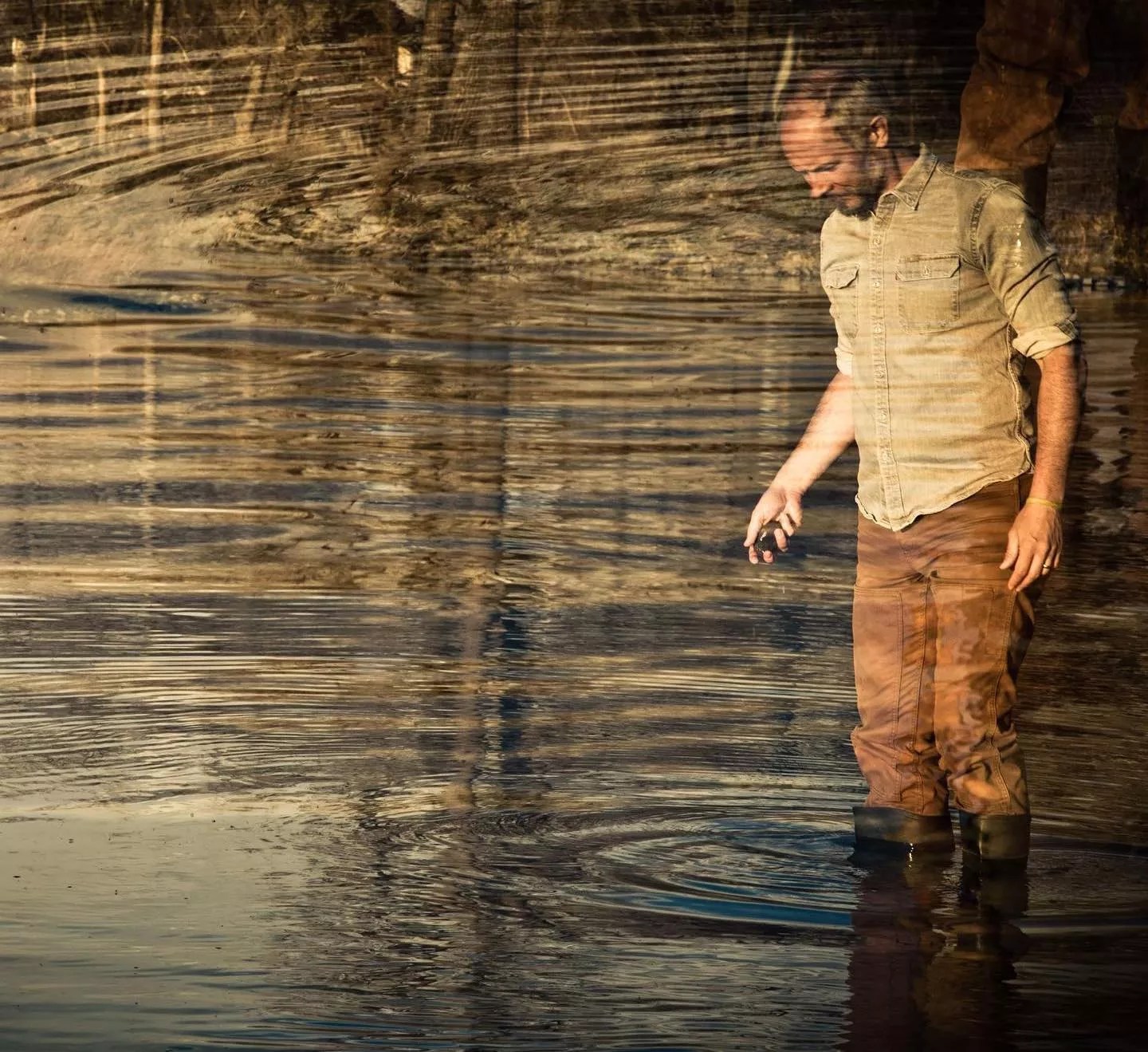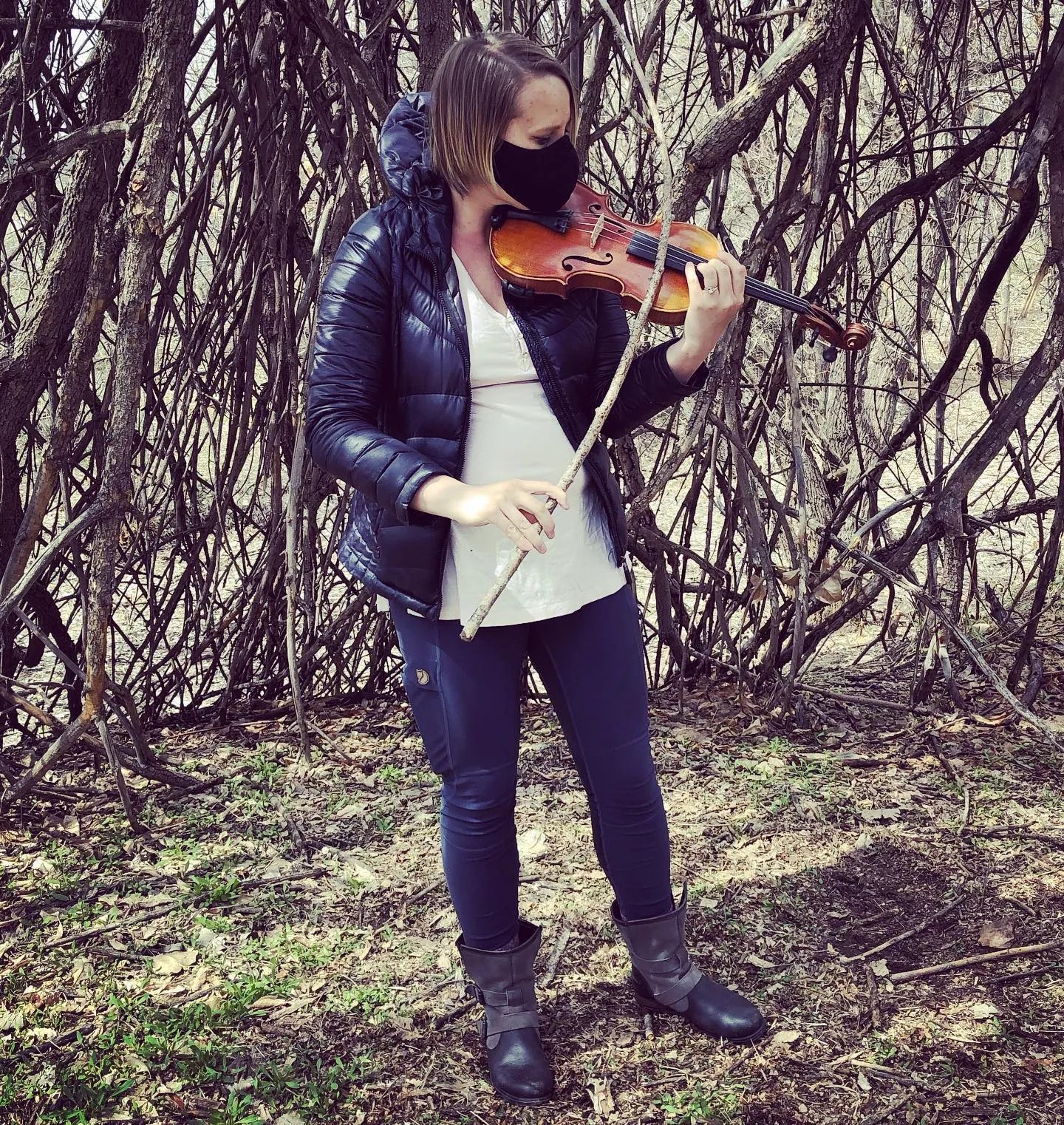
Courtesy of Control Group Productions

Audio By Carbonatix
In 1965, the Platte River flood inundated a swath of Colorado landscape that stretched from Castle Rock to Sterling and the northeastern plains. While the flood is mainly remembered now for the damage it wreaked through Denver, the suburb of Littleton also suffered its fury, as the waters ruined bridges, swept away trailer parks and trashed the old Centennial Race Track.
Some good came out of the damage along the flood’s pathway. The Platte, then an urban garbage dump, was cleaned up and its shores redeveloped into a coordinated county-crossing bike trail and greenway. That’s where the story of After the Flood – a new outdoor immersive experience from Lakewood-based performance company Control Group Productions in Littleton’s Reynolds Landing open space park – begins.

Patrick Mueller wades in the water at Reynolds Landing on the Platte.
Courtesy of Control Group Productions
The idea for After the Flood was sparked, says Control Group director Patrick Mueller, by another wide-ranging disaster in a new century: the pandemic.
“We started spending a lot of time outside as a family,” Mueller explains. Once Mueller, his partner, Kristine, and their son discovered the park, they returned to the wild oasis again and again. “The site was gorgeous,” he adds. “I couldn’t stop going there.”
As he learned more about the park and its stretch of the Platte, Mueller became interested in its history, the flood, and how it changed the river’s banks through the instigation of not-always-wise choices in redevelopment. But Reynolds Landing is indicative of the best urban planning.
“I started reading about the flood,” he says. “There really is a story there in Littleton.” His thoughts also turned to climate change and how that, too, made spaces like Reynold’s Landing more precious. “It’s the result of a small community making a difference through community action – so cogent.
“When the City of Littleton amended the water appropriations act, it was NIMBYism,” Mueller notes. “I thought if we all got NIMBY in the right way, it felt like a wonderful package.” He pays homage to the town’s ability to return a stretch of the Platte back to its natural state.

Control Group performers stand in the shadows.
Courtesy of Control Group Productions
“These millennials and Gen-Xers, the bright-eyed kiddos, see history that’s lost,” Mueller continues. “It’s easy to see the worst thing happening in the world through media, but it’s become harder to see what happened one town over. It’s a story worth breathing life into.”
That breath of life has come to Reynolds Landing in the form of an eighty-minute immersive nature walk that blends creative movement performed by Control Group, a pristine soundtrack using found objects from nature by the experimental music group Playground Ensemble, and artist Adrienne DeLoe’s props and costume, which incorporate natural materials to lend a sense of wonder to the completed work.
It also marks a moment of change in Control Group’s partnerships. Playground and DeLoe came on board as unknown factors, diverging in style from people Mueller had worked with for years before leaving the fold, and no one knew exactly how that would work.
Mueller approached Playground Ensemble director Conrad Kehn on the suggestion of composer Nathan Hall, and says there was an immediate spark when they met to talk at the park. “We had an electric first conversation,” he recalls. “He was picking up rocks and sticks and making music with them.”

Playground Ensemble violinist Sarah Whitnah tests a tree-limb bow.
Courtesy of Control Group Productions
As for Kehn, he says he needed to know that it was an opportunity for true collaboration – that his part in the show wouldn’t stay in the background, as dance music often does. On the other hand, he hardly expected top billing. “Playground doesn’t do background well,” he notes. But while wanting to serve Playground’s mission, Kehn also wanted to be able to “step forward when I see the opportunity and make sure Playground would be represented as an equal partner.
“It has turned out to be a very collaborational experience,” he quickly adds. “The fact that as musicians we’re not using the same terminology or language is not necessarily an issue. When working with very skilled, classically trained players, I usually need to become focused on giving instructions and executing instruction. But if we agree to get into a more creative stage, what should we do? We go back to being musicians and stop worrying about instructions. We break out of the everyday part of making something, like a band.”
It’s been a nice shakeup for Kehn, asking violinist Sarah Whitnah to use a stick as a bow on a fine instrument or simply learning himself to be freer as a musician. “We decided not to lug in a bunch of electronic equipment,” he says, noting that they settled on an “organic and natural” aural representation of the four elements – air, water, wood and stone – using violin and percussion to interact with the environment.

A moment of repose in the heart of nature.
Courtesy of Control Group Productions
DeLoe, whom Mueller already knew as a childhood friend of his stepsister’s, already has an art practice that relies heavily on materials from nature, such as animal bones, seed pods and preserved insects. Ideas for After the Flood‘s nature-inspired prop and costume design came naturally to her.
“I used materials that came from the South Platte area where the performance is taking place, collecting things like wood, fish bones, clamshells and moss,” DeLoe says. “It’s been an interesting process to incorporate what I use in my own practice. While this process is a little out of my wheelhouse, it’s been a natural progression.”
In particular, her primeval antler headdresses incorporating tree branches laced with colored twine and strewn with her riverside findings, made a splash when she handed them over at a rehearsal in the wild. “It was a magical moment of us working together, and the aesthetic has been instantly understood by each other,” she says.
These untried additions to the overall Control Group vision have jelled nicely, giving Mueller a moment of relief after taking a leap of faith. Everyone in the production has embraced the minimalist approach to After the Flood.

Control Group dancers and musicians at ease at Reynolds Landing.
Courtesy of Control Group Productions
“I feel blessed, honored and humbled,” Mueller says. “When things fell apart, to then have things fall into place on a new collaboration is great.” How have those elements fallen into place? “They are still doing that,” he admits. “The show and the experience of nature itself is great, the music is great, the props are beautiful, the dance is lovely and powerful, and I’m proud of our scripted storytelling.”
But this is more than just telling a story, he adds. “The arts have a unique, crucial role to play there, positioning people in the current moment. Putting a body into a burn area is different from seeing the devastation on TV. Talking about the flood action that came out of it – that’s a climate-action parable. Here is a place that was once twenty feet under, and we have the opportunity to make it real for people.”
After the Flood runs Thursdays, Fridays and Saturdays, at 5:50 and 7:20 p.m. nightly, through June 19 at Reynolds Landing, South Platte Park, 6745 South Santa Fe Drive, Littleton. Tickets, which are going fast, range from $15 to $40 at the Control Group website.